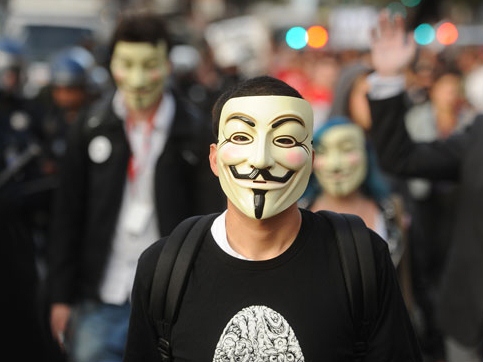“We Are Legion: The Story of the Hacktivists” screened at the SXSW Film Festival last week. The film traces both the history and philosophy (or lack thereof) of this shadowy, quasi-anarchist “organization” called Anonymous that wields tremendous power over the internet.
The filmmaker managed to get Skype interviews with what I assume are some of the “leaders” of the “movement” (I’ll tell you why I keep using quotation marks in a moment), as well as former members and internet security experts.
The film presents a portrait of Anonymous, from its early days when its sole purpose was to prank various people and groups by pissing them off to the point of making their heads spin. Of course, it has since morphed into an entity capable of inflicting severe damage.
The film is not only entertaining, but it is a balanced work that raises some fascinating philosophical questions about the nature of anarchy, the necessity for pushback against the abuse of the judicial and financial system and the obligations of living in a free society.
Here’s what I found philosophically intriguing about Anonymous that I had not previously considered. In the film, one member proclaimed that the group exists to protect against censorship on the Internet and work against oppressive governments. It would be great if there was an organization that was truly independent of any authority, one that wielded the power to shut down a website or government that was doing wrong.
That, of course, can only exist in an ideal world where things like superheroes exist. And with superheroes we know the mythology – with great power comes great responsibility, and all the superheroes are on the side of good. Anonymous, however, consists of human beings who are inherently flawed.
At first blush, it’s hard to argue against Anonymous’ attack on the Church of Scientology in retaliation for its attempt to suppress the release of internal documents through onerous litigation. It’s also difficult to argue that Visa and Mastercard aren’t being hypocritical when they prohibit donations to Wikileaks yet permit them to Neo-Nazi groups. Those companies were perhaps deserving of some payback.
Nevertheless, Scientology and the credit card companies did not do anything illegal. Anonymous appeared to act simply because they chose to, and forced their moral and ethical positions onto others in the form of a criminal act. Once that line gets crossed, the moral high ground becomes less obvious.
Indeed, I would argue that attacking a private company that publishes non-partisan and intelligent geopolitical analysis (STRATFOR), stealing their documents and handing them over to Wikileaks, is not moral nor ethical. Nor is shutting down Sony’s Playstation system and stealing customer data. Why harm the end-user?
Then the pendulum can swing another way. It’s also difficult to argue against Anonymous’ assisting oppressed Egyptians and Tunisians to overthrow their respective governments. And so we have the conundrum, and thus the reason the film is provocative and challenging.
Like the ACLU, I like the idea of Anonymous but not all of its execution. I’m a staunch anti-authoritarian kind of guy, so I find the concept of Anonymous to be seductive and attractive. I love that they can disrupt these huge organizations at will. It forcibly reminds them of the need for humility and consistency of policy. The primary problem, from my perspective based on the film, is that Anonymous appears to be an anarchist movement with no real leadership, form, or consensus on what their code of conduct should be.
That’s the very problem with an anarchist organization – its insistence on anarchy collides with the very notion of a code of conduct or mission statement or defined philosophy. Certainly, the existence of Anonymous itself reminds us all of the importance of privacy and the lack of respect that various entities are affording that privacy.
It also exposes hypocrisy and assists in the overthrow of repressive governments. Thus, I think I’d rather that Anonymous exist than not, if only to provide a deterrent and give the abusers of the system food for thought. To the film’s credit, all of these issues are explored and I felt the presentation was relatively balanced. It’s an intriguing film, very much worth seeing, and raises many issues worthy of lengthy discussion.

COMMENTS
Please let us know if you're having issues with commenting.